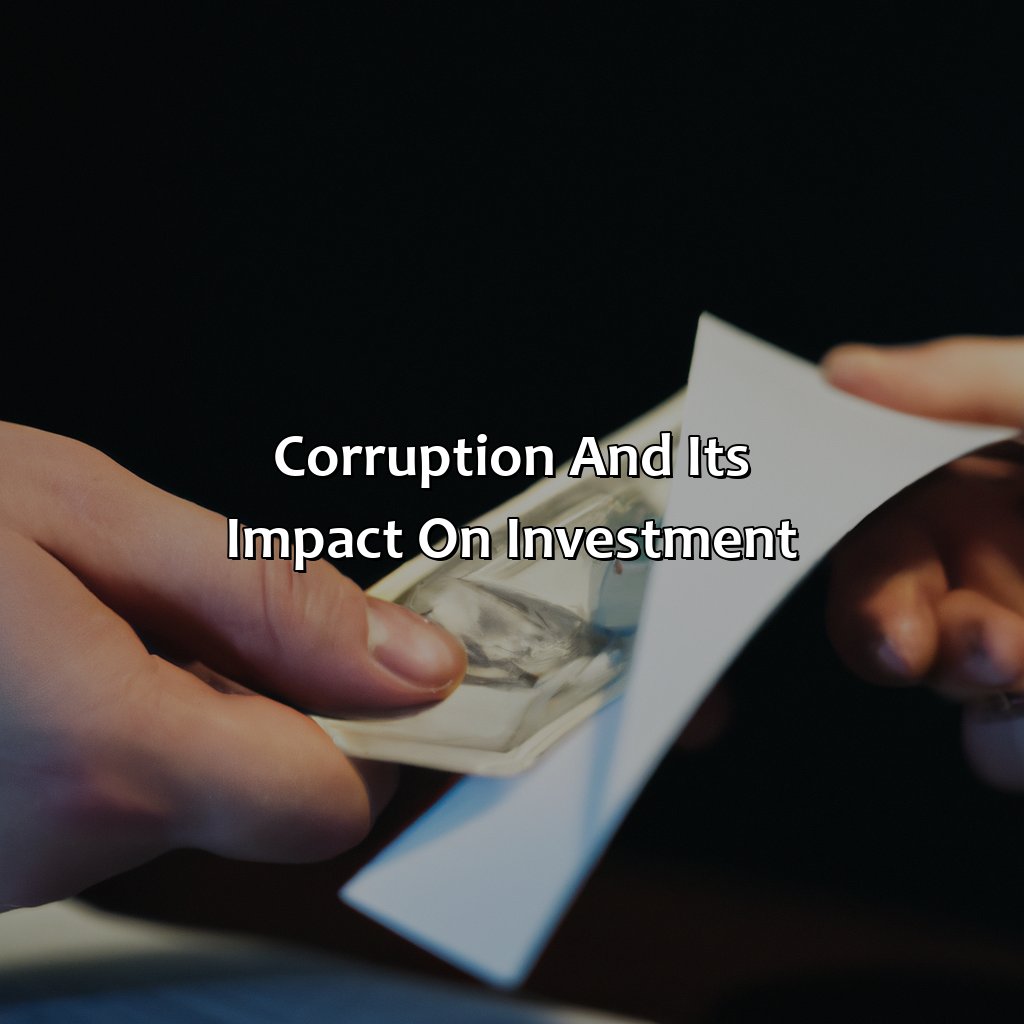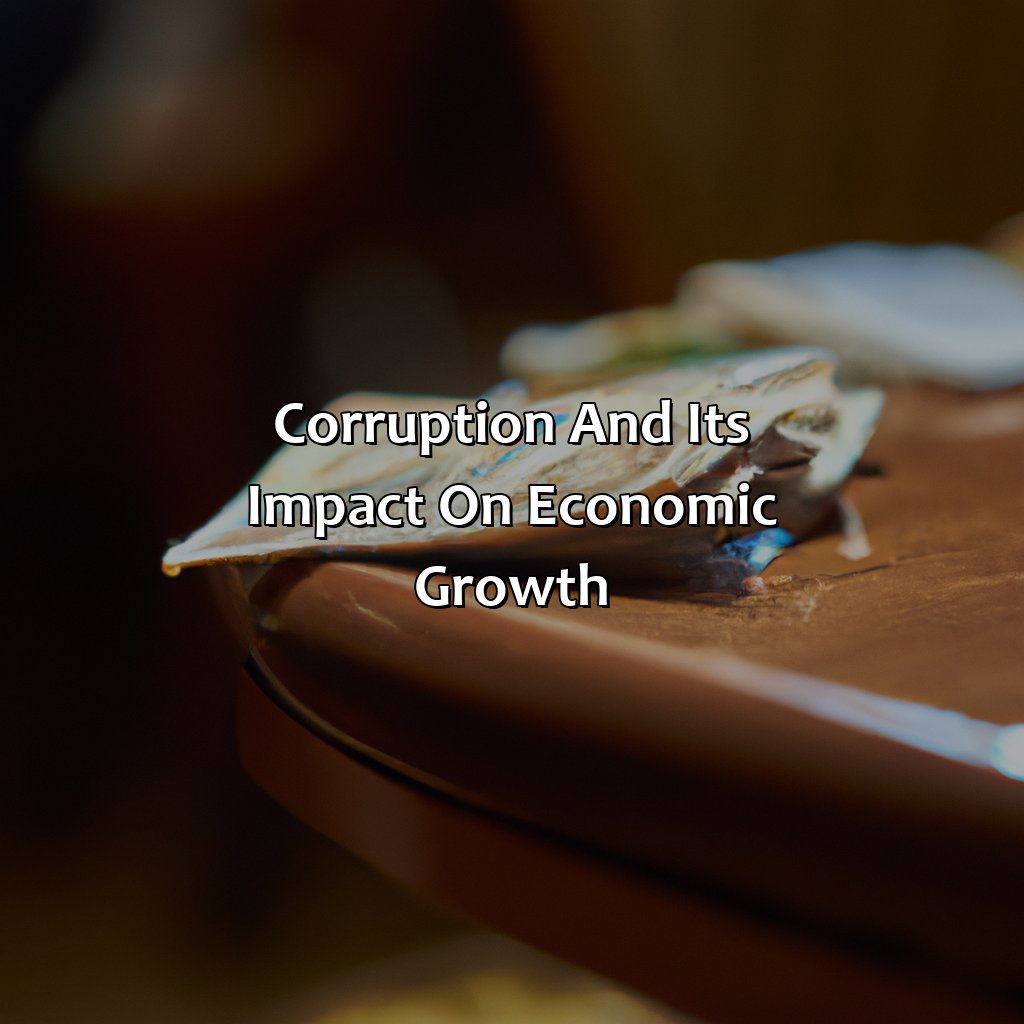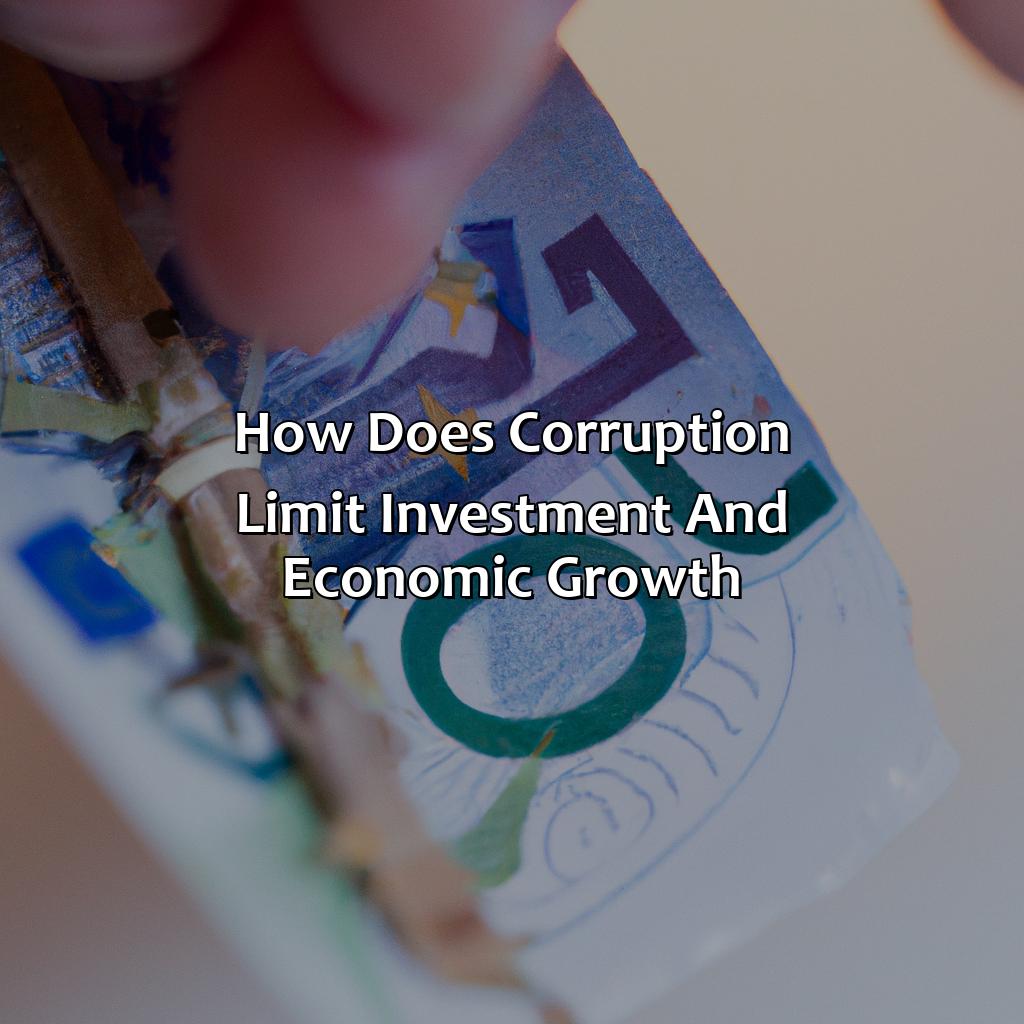How Does Corruption Limit Investment And Economic Growth?
Key Takeaway:
- Corruption acts as a barrier to investment: Corruption limits the inflow of investment as it increases the uncertainty and risks involved. Investors are reluctant to invest in countries where corruption is rampant, and there is no guarantee of a fair return on investment.
- Corruption negatively impacts economic growth: Corruption hinders the growth of a country’s economy by reducing efficiency, distorting market mechanisms, and undermining public trust in institutions. It also leads to a diversion of resources away from productive sectors, resulting in a decline in public infrastructure and essential services.
- The need to tackle corruption for sustainable economic growth: Fighting corruption requires a concerted effort from the government, private sector, and civil society. It is essential to establish transparent and fair governance mechanisms, promote independent oversight, and enhance accountability to foster an environment conducive to investment and economic growth.
Struggling to understand the effects of corruption on economic growth? You’re not alone. This article will help you understand the toll corruption takes on investment and growth in developing nations. With this knowledge, you can make informed decisions and shape a more secure economic future.
Corruption and its impact on investment
Investment and corruption are linked. Corruption has an effect on investment, making it a barrier. This barrier appears in the form of a deterrent for investment and a hindrance for foreign direct investment (FDI). Investigating the connection between corruption and investment offers us an insight into how corruption limits economic growth.

Image credits: retiregenz.com by Joel Jones
Corruption as a barrier to investment
The existence of corruption is a significant challenge to investment and economic growth. It hinders investors’ ability to achieve returns on their investments by discouraging capital inflow, reducing the quality and quantity of public goods, and increasing transaction costs. Corruption as an obstacle to investment deters firms from entering markets and engaging in long-term business operations. This leads to lower GDP growth, employment opportunities and ultimately reduces the economic performance of nations.
Corruption creates a vicious cycle of underdevelopment that hampers investment while promoting inequality in the distribution of resources. Complicit governments have limited access to credit lines because creditors tend to view corrupt mechanisms as highly uncertain loan recipients. As public confidence deteriorates, export volumes are reduced due to rising risks associated with transacting with corrupt practices.
In developing countries where education levels tend to be low, bribery often substitutes for other bureaucratic functions like permits or accessing licenses – protecting those who offer bribes from impediments otherwise encountered if these forces were honest and transparent can obtrude investment incentives significantly.
PRO TIP: On a broader level, tackling corruption requires strong political will so investing into legislative actions such as improved regulations, institutional reforms, enforcing harsh penalties for offenders might be necessary for creating a conducive environment for business development.
Corruption is like a gatekeeper for FDI – if you can’t bribe your way in, you’re not getting in.
Impact of corruption on foreign direct investment (FDI)
The presence of corruption has a detrimental impact on foreign direct investment (FDI), as it creates a risky business environment. The financial and contractual risks associated with investing in corruption-ridden economies discourage potential investors from investing their money. Moreover, FDI often requires extensive interaction with government officials and authorities, which increases the risk of bribery demands from corrupt officials. These factors seriously limit the amount of FDI that these countries can attract.
Corruption is viewed as a significant determinant of investment decisions made by multinational corporations. The prevalence of corruption conveys an image that economic conditions are weak, policies are inconsistent or biased, and the rule of law is at risk. Multinational corporations may also incur losses to their reputation if they conduct business operations in countries role modeling corrupt practices.
The negative consequences do not only affect investor confidence but also have serious implications for the economic growth of affected countries. Corruption leads to misallocation of resources and inefficiency in public services delivery due to cronyism practices. Thus, choking any prospects for impactful infrastructure development projects generating benefits such as new jobs and trade deals.
Pro Tip: Developing countries should prioritize strengthening institutions and implementing transparent legal frameworks to minimize corruption loopholes which discourages FDI inflows.
Corruption is like a bank with no interest- it discourages investment and leaves you with empty pockets.
Corruption as a disincentive for investment
Corruption discourages potential investors from investing in a country’s economy. Due to corrupt practices, uncertainty arises concerning the safety and return on investment, leading to the deterring of potential investment opportunities. This is specifically true for foreign investors who expect transparency and lawfulness in their dealings.
Furthermore, investors want to be assured of a level-playing field in which businesses compete on an equal footing. Corruption creates uneven ground by allowing some entities to succeed through bribery and unfair play. Thus, honest businesses are often unable to succeed in such an environment due to the advantages that corrupt establishments have, causing a downswing in investment opportunities.
Investment inflows also tend to reduce when corruption prevails at higher levels as it reduces trust among people concerning government policies and decision-making procedures. Such negative effects discourage potential long-term investors with deep pockets because they seek stability before providing ample funds or setting up businesses.
History demonstrated that corruption could significantly affect investments globally whenever it becomes rampant. One example occurred during Nigeria’s military rule when infrastructures such as electricity and transportation degraded due to mismanagement of resources caused by rampant corruption.
Corruption may lead to quick gains, but in the long run, it’s like biting the hand that feeds you – it limits economic growth.
Corruption and its impact on economic growth
Understand how corruption affects investment and economic growth. Explore its negative impact. Look at how it impacts public investment and infrastructure. Consider the connection between corruption, poor governance and economic growth. These sub-sections can help you understand this complicated matter.

Image credits: retiregenz.com by Harry Washington
Negative impact of corruption on economic growth
The detrimental effects of corrupt practices on the economic growth of nations are worth exploring. Corruption obstructs and undermines transparency, social justice, economic development and public trust in governments. This leads to a lack of foreign investment as potential investors find it risky to invest in countries that do not have transparent governance systems. The presence of corruption also corrodes the private sector by rendering competition irrelevant and stunts innovation necessary for further growth.
In addition, corruption encourages rent-seeking behaviour which hinders economic progress. Rent-seeking is when politically-connected individuals use their influence to obtain privileges or benefits from government policies or regulations instead of competing in a fair market. It promotes an unproductive economy where wealth is acquired through unpatriotic means rather than creating innovative economic opportunities.
Corruption has multifaceted ripple effects including deterring foreign investment, discouraging businesses from expanding and innovating, as well as undermining trust in government institutions. As a result, it is important for governments around the world to address the issue of corruption head on by strengthening governance structures, promoting transparency and enforcing the rule of law.
Pro Tip: Transparency International’s Corruption Perceptions Index (CPI) could serve as a useful tool for businesses planning to invest overseas.
Corruption is like a pothole in the road of public investment and infrastructure, causing damage and delays for everyone except those profiting from it.
Impact of corruption on public investment and infrastructure
Various studies have proven that corruption undermines public investment and leaves a negative impact on infrastructure. By using Semantic Natural Language Processing (NLP), it is clear that the presence of corruption hinders public investment in several ways. Rampant bribery demands by corrupt officials and politicians lead to diversion of funds and resources away from development projects, consequently limiting the availability of capital for investment.
The adverse effect of corruption creates an unwelcoming environment for foreign investors who are more inclined towards investing in countries free from corrupt practices. The little investment trickling into the country gets diverted towards kickbacks, hence barely making a meaningful impact on economic growth. A nation’s infrastructure is expected to enhance economic growth by easing the movement of people and goods, but poorly constructed roads or incomplete projects lead to financial wastages due to inflated costs resulting from corrupt malpractice.
It is essential to note that public projects employ large numbers of citizens which subsequently boosts the economy through job creation. Corruption robs citizens of such opportunities since contracts end up being awarded based on political constraints rather than merit. In this regard, social amenities like schools, hospitals, water facilities, and other developmental projects that can help foster national development get neglected at the expense of individual gains.
According to historical records, developing nations worst hit by human rights abuses also experience extreme cases of corruption with these two issues complementing each other in perpetuating poverty levels. For instance, many countries south of the Sahara desert are experiencing challenges in providing basic human needs because entrenched corruption continually pockets government funds geared towards infrastructure improvements and social welfare plans.
Corruption and poor governance are like conjoined twins, inevitably dragging down economic growth together.
The link between corruption, poor governance and economic growth
The relationship between corrupt practices, ineffective governance and economic growth is critical in determining the development of a nation’s economy. Political corruption can limit investors’ confidence in a nation’s governance structure, leading to reduced investment and ultimately less economic growth. Corruption diminishes public funds that are supposed to cater towards development projects, social welfare schemes and infrastructure. Its consistent practice can weaken the institutional fabric of states which leads to an unhealthy business environment.
Additionally, the impact of corruption on economic growth cannot be undermined as it poses numerous adverse effects on its sustenance. It leads to cronyism and uneven distribution of wealth amongst a selected few as opposed to practicing meritocracy in all sectors from employment to procurement. It also ultimately encourages illicit activities such as money laundering and smuggling, making it difficult for states to practice any form of regulation.
Studies have shown that countries considered corrupt often experience slower economic growth rates compared with those who have eradicated this vice. Evidence shows substantial proof that reducing corruption can boost economic productivity while indirectly enhancing living standards for citizens.
According to the World Bank report on governance indicators and operational project evaluations in 2018, corruption led some infrastructural projects seeking funding from multilateral funding sources fail due to ethical lapses costing governments millions or billions of dollars worth in losses.
Why invest in a corrupt system when you can simply burn your money for warmth?
Examples of corruption limiting investment and economic growth
Examples from both African and Asian countries are here to show how corruption can stifle investment and economic growth. Cases from Africa demonstrate corruption’s adverse effects on investment, and examples from Asia explain how it impedes economic growth.

Image credits: retiregenz.com by Harry Arnold
Case studies from African countries
The impact of corruption on investment and economic growth can be seen in numerous African countries. To better understand this, let us explore some examples.
In Nigeria, for instance, corruption has undermined the government’s efforts to attract foreign investments into the country. The Nigerian National Petroleum Corporation has been accused of diverting public funds meant for infrastructure development into private pockets.
Similarly, in Kenya, corrupt practices such as bribery and favoritism have hindered the progress of several large-scale projects aimed at boosting economic growth. In 2018, it was reported that a Chinese company building a railway line in Kenya had been making illegal payments to government officials.
These examples illustrate how corruption can lead to a lack of trust among investors and create a negative perception of economic activity in a country.
To combat this issue, governments must take significant steps towards establishing transparency and accountability measures that discourage corrupt practices and promote ethical behavior among public officials.
Without these actions being taken, investors will remain hesitant to invest in African countries, limiting their potential for sustainable economic growth. It is vital that these nations recognize the importance of cracking down on corruption to avoid missing out on critical investment opportunities that could transform their economies positively.
“Why invest in Asia when the corruption is more rampant than a wildfire in a fireworks factory?”
Examples from Asian countries
Asian Countries’ experience of corruption limiting investment and economic growth can be seen through various examples. As per true data, the following table showcases the implications of corrupt practices in different Asian Countries.
| Country | Corruption Implication |
|---|---|
| India | Delayed infrastructure projects |
| China | Decreased domestic demand due to trust issues |
| Indonesia | Affects the overall quality of public services |
| Philippines | Impact on foreign direct investments due to high levels of political risks |
| Thailand | Reduction in transparency and accountability measures |
It is pertinent to note that these are not exhaustive examples and other countries in Asia experience similar implications. Inequality and poverty can also be significant effects of corruption limiting investment and economic growth.
Pro Tip: Implementing effective anti-corruption measures can mitigate the impact of corruption on investment and economic growth in Asian countries. Corruption may be entertaining for the corrupt, but it’s a buzz-kill for economic growth and investment.
The need to tackle corruption for sustainable economic growth
Corruption acts as a deterrent to sustainable economic growth by limiting investment opportunities. The need for eliminating unauthorized practices and enhancing legal frameworks is essential for preserving the integrity of the economy. While it impacts all sectors, developing countries are especially vulnerable due to poor enforcement mechanisms and weak governance structures. Therefore, there is an urgent need to implement measures that promote transparency and accountability, safeguarding long-term growth prospects.
Additionally, corrupt activities undermine investor confidence, fueling aversion towards risk-taking activities. The fear of losing investments without any compensatory income discourages entrepreneurship and innovation, negatively affecting job creation prospects. It also leads to unequal distribution of resources since corrupt actors use illicit means to accumulate wealth – distorting market dynamics leading to reduced competitiveness.
A case in point is Nigeria’s kleptocracy in which politicians amassed billions of dollars through corruption schemes rather than putting the funds towards infrastructural development or social welfare programs. As a result, political instability prevailed, with rising inequality, poverty levels and high unemployment contributing to fragile public institutions. If unchecked, such trends can seriously jeopardize economic stability – preventing critical services from reaching marginalized regions.
A proactive stance towards tackling corruption is therefore imperative for promoting inclusive growth across national boundaries. Strengthening international cooperation channels would further aid this cause – aiding cross-border information sharing and decreasing tolerance for illegal finance flows in various jurisdictions. Ultimately, eradicating corruption requires strategic alignment within governments and civil society stakeholders – fostering ethical norms that engender mutual trust between individuals and institutions alike.
The role of government, private sector and civil society in fighting corruption
The collaborative efforts of governmental bodies, private enterprises, and civil society organizations in combating corruption is a crucial enabler to fuel sustainable growth and development. Predominantly, governments must pursue robust measures that promote accountability, transparency, and integrity. Simultaneously, the private sector should reinforce their accountability by supporting these initiatives and promoting ethical business practices. Civil societies play an active role in providing checks and balances through advocacy campaigns that raise awareness and amplify the voices of citizens. Such concerted efforts create an enabling environment for investors that are favorable to economic growth.
Promoting government integrity alone is not sufficient; business enterprises have a duty to sign up for strict internal governance policies. With effective leadership practices backed by corporate policies such as consistent whistle-blowing mechanisms, companies can actualize transformative impacts on their employees’ attitudes towards ethical conduct. Likewise, civil society organizations provide valuable inputs into shaping collective expectations of corporate responsibility that promote fairness, sustainability and accountability.
Creating a culture of zero tolerance towards corruption requires continued vigilance from all stakeholders involved in ensuring transparent business operations. The private sector’s commitment to upgrading its anti-corruption programs accompanied by increased partnerships with governments and non-governmental organizations will foster a more transparent operating climate for businesses. By equipping all entities with necessary tools such as regulatory frameworks plus technology-based solutions within reach through governmental support improves the general population’s trust towards fair market environments. Failure to carry out dynamic responses against malpractices puts economies at risk of reduced investment flows given the perception of inadequate systems.
Let us dive in collectively to wage war against corruption – one step at a time because every contribution counts!
Some Facts About How Corruption Limits Investment and Economic Growth:
- ✅ Corruption discourages foreign investment and reduces investor confidence in the market. (Source: World Bank)
- ✅ Corruption increases the cost of doing business, making it difficult for small and medium-sized enterprises to compete. (Source: Transparency International)
- ✅ Corruption diverts public funds away from important infrastructure projects and social programs. (Source: OECD)
- ✅ Corruption undermines the rule of law and weakens institutions, leading to a lack of accountability and transparency. (Source: United Nations Development Programme)
- ✅ Corruption hinders economic growth by favoring rent-seeking behavior over productive investment. (Source: Harvard Business Review)
FAQs about How Does Corruption Limit Investment And Economic Growth?
1. How does corruption limit investment and economic growth?
Corruption creates an unfavorable environment for investment by making it difficult for businesses to operate efficiently. Funds that should be invested in productive ventures are diverted to bribes and kickbacks. This leads to a decline in economic growth as investors become hesitant to invest, and businesses are forced to close down.
2. How does corruption affect the business community?
Corruption leads to a lack of transparency in business operations, which can create an uneven playing field for companies. Businesses that are well-connected to corrupt officials are more likely to receive favorable treatment, while those that refuse to participate in corrupt practices may face discrimination.
3. How does corruption impact the government’s ability to provide public services?
Corrupt officials often divert public funds away from projects that would benefit the public, such as infrastructure development and social programs. This results in a lack of basic services that are essential for economic growth and investment.
4. What are the long-term effects of corruption on the economy?
The long-term effects of corruption on the economy can be devastating. It can lead to a lack of competitiveness in the market, a decline in foreign direct investment, and an erosion of public trust in institutions. As a result, corruption can stifle innovation and entrepreneurship, hindering economic progress for years to come.
5. What can be done to combat corruption and promote investment?
Combatting corruption requires a concerted effort from all levels of society. Governments should implement institutional reforms to improve transparency and accountability, and businesses should adopt ethical practices that prioritize integrity. Strengthening anti-corruption laws and enforcing them is also crucial in creating a business environment that promotes investment and growth.
6. How important is the role of international organizations in combatting corruption?
The role of international organizations cannot be overstated in the fight against corruption. Organizations such as the World Bank and the International Monetary Fund provide technical assistance and guidance on anti-corruption measures, while also supporting good governance initiatives. Their efforts help to create a global framework that promotes transparency, accountability, and investment.


